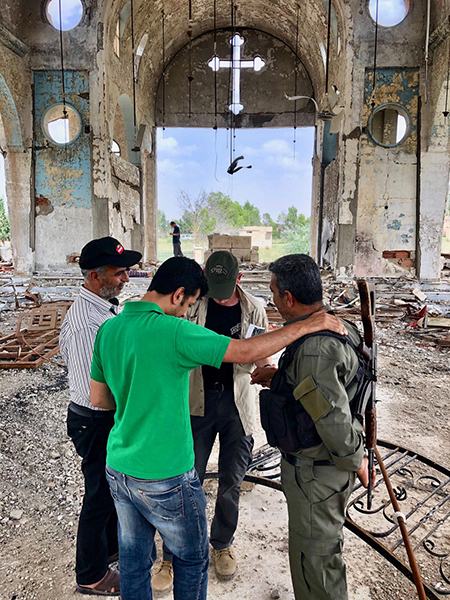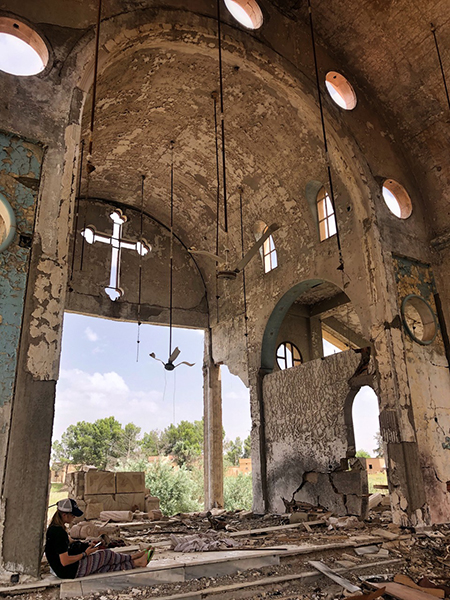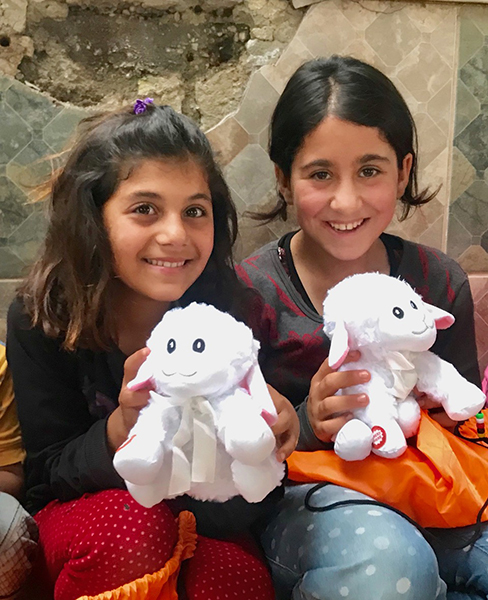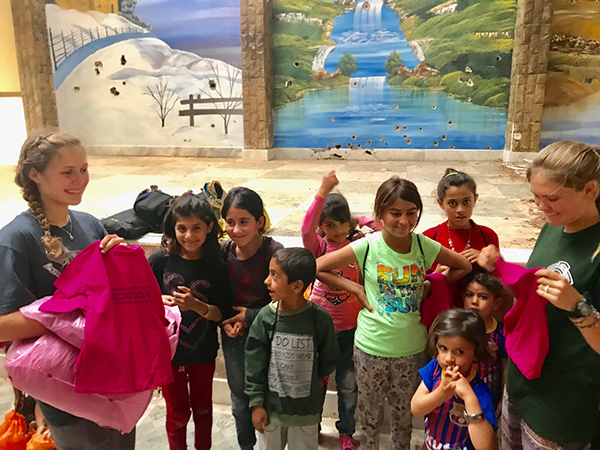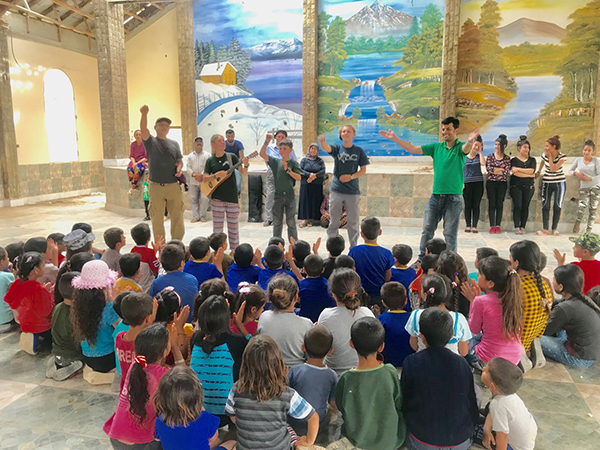Syria Report, Part One: Ethnic Cleansing and the Persecution of Yezidis and Christians in Afrin, Northwestern Syria
13 June 2018
Afrin, Syria
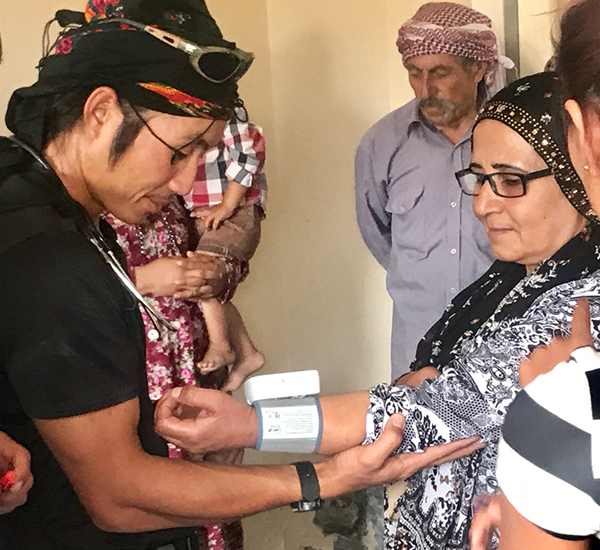
This is the first of a three-part report on Syria and our recent mission there. This was our fifth mission to Syria to give medical and other humanitarian help, build playgrounds in areas previously held by ISIS, and share the love of Jesus. We were a 17 person team; five ethnic medics and cameramen from Burma, three American volunteers, our Kurd, Iraqi, and Syrian coordinators and our family.
We entered Syria from Iraq and traveled to Raqqa, Tabqa, Deir ez-Zor, Ayn Issa, Membij, Kobani, Qamishli, Tel Tamir, Hasakah, and surrounding areas.
Background
Syria is in its seventh year of civil war; 500,000 people have been killed and over 11 million displaced (over six million people internally and over five million refugees have fled the country). And the fighting escalates: Assad’s regime continues to pound rebel-held areas outside of Damascus, Idlib, and other resistance-held areas. The Russians, who are supporting the Assad regime and who had stationed troops in Afrin to block ISIS as well as Turkish ambitions, suddenly abandoned Afrin at the end of 2017.
In January 2018, the Turkish Army, along with elements of the Free Syrian Army (FSA), who in this area are composed of radical Muslim groups and some remnants of ISIS, launched an air and ground campaign from Turkey against the city and area of Afrin, one of the only peaceful areas of Syria. The Kurds had kept ISIS at bay all through the war and Afrin, which historically was 80% Kurdish with an ancient Christian and Yezidi population, had become a refuge for thousands of fleeing Kurds and Arabs of different groups and faiths. Turkey is now presiding over an ethnic cleansing of massive proportions in Afrin.
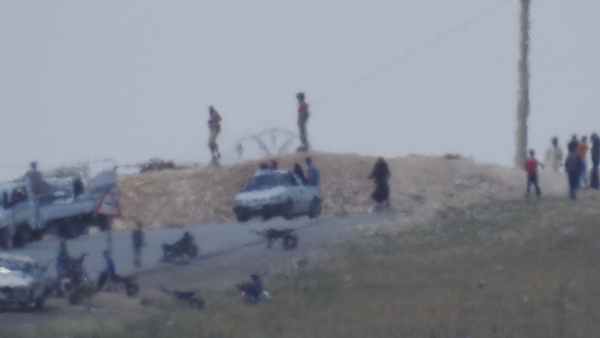
The Turkish government has led this onslaught in order to crush the YPG Kurds and block their access to the Mediterranean Sea. They consider the Kurds a threat to Turkish security and have no regard for the Christians or Yezidis there. The Turkish government also supports the FSA against the Syrian government and Afrin has become a base for the FSA. A new reign of terror has descended over Afrin.
Joint Turkish and FSA attacks have swept over 200,000 Kurds, as well as 35,000 Yezidi and 3,000 Christians from their villages and towns. Their homes have been appropriated by thousands of radical Islamists brought from southern and western Syria, who have also been pushed out of their homes by Assad’s Syrian Army. The original Muslim inhabitants who did not submit themselves to Sharia law and the FSA have also had to flee. Based on interviews, the only church in Afrin city has been looted, burned inside, and then taken over by two militia factions.
Christians Who Fled Afrin
In Kobane and at a new Christian church of 20 believers, we met with two Christian families who fled Afrin when the FSA and Turkish Army invaded. After the worship service, we talked with the Christians from Afrin, a mother and her 18-year-old son, Baran, her son-in-law, and her pregnant daughter.
They had fled Afrin as the FSA and Turks assaulted the town and region, barely getting out with their lives. The mother told us that there were over 3,000 Christians who used to live in Afrin but now almost all had fled. She only knew of two people who remained: her husband who was too sick to make the walk out and another man who was wounded during attacks.
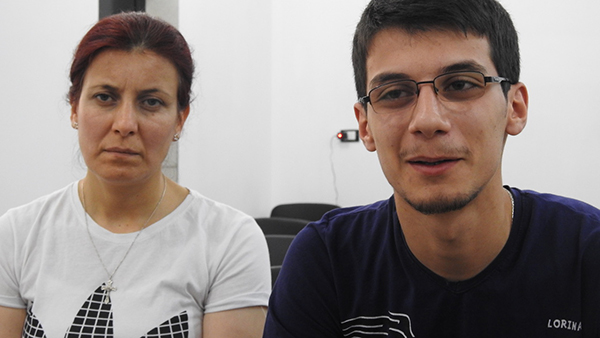
While holding back tears she said, “I am a Christian. My husband was too sick to walk out and escape [with us] and he is in hiding in Afrin now. I only have my son and daughter left with me and nothing else in the world. Can you help us? Thank you for coming to see us and for the help you have given. We pray with you for God’s answer and we trust Him.
The FSA and Turks had pushed into Afrin in a brutal series of infantry and armor attacks supported by artillery, helicopter gunships, and jet fighters. Hundreds of civilians were killed and homes destroyed. Many of the Kurd YPG forces were killed and the rest were forced to retreat. The FSA and Turks closed in, killing and looting. People tried to flee.
“Our worst fears were confirmed when Sharia law was installed, homes looted, and people who resisted killed. We Christians fled and most of the 35,000 Yezidi fled as well, fearing a similar annihilation that had occurred in Sinjar, Iraq,” continued the mother.
She went on to share how one woman was captured by the FSA, raped, and then murdered, a video being sent to the woman’s husband.
“My niece, a small child was killed as well,” she shared. “Her name was Riven Khandofan Hamdoush and she was killed near us in the village of Kafarganeh. The village is located on the edge of the city of Afrin. On 27 April 2018, when the child was playing in the street, she was shot dead when the Islamic factions were quarreling with each other on the property. Here is her picture.”
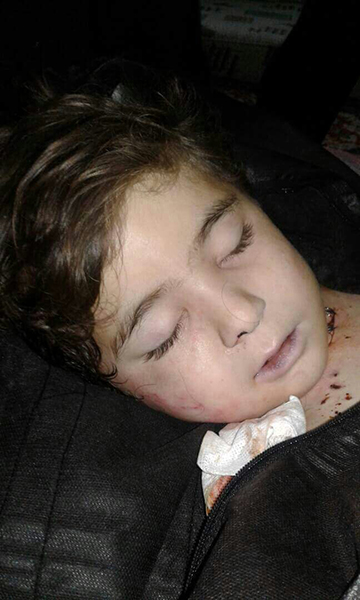
“We are very sad and feel hopeless but keep close to Jesus and put our hope in Him. I used to be a Muslim myself but four years ago I got tired of it and asked Jesus to help me. Most of my family are still Muslim but that has not spared them from attack. My niece who was killed was Muslim with Muslim parents,” she said.
Her son, Baran, told us:
“I became a Christian recently when Jesus appeared to me in a dream. In Afrin I worked at a computer shop until the FSA and Turks invaded. It became impossible to stay as airstrikes and artillery hit us. Then the Turkish infantry joined the FSA and, supported by tanks, they destroyed anyone in their path as they advanced. We had to flee and we barely got out, going on foot day and night. I thank the Lord Jesus for helping us to meet with you and sharing our prayers with each other. When we see you, we feel we are humans standing together. I would like to tell you frankly that my mother and I would like to get out of here but there are obstacles that stand in the way. May the Lord take care of you, and that when you shall die it will be with a thousand good things.”
The Church of the Good Shepherd in Afrin
Baran went on to tell us about a church in Afrin:
“The Church of the Good Shepherd was taken over by the FSA and the Turkish Army. The armed factions of the Turkish occupation fought with each other for control and confiscation of the church. The fighting that took place between the two factions of ‘Sultan Murad’ and the ‘Army of the East’ ended with a settlement between the two parties about sharing the church building and surrounding buildings as well as its assets.
They burned the inside of the church and wrote the names of their factions on the outside walls. Before the FSA and Turks arrived, more than 250 Christian families were still in the center of the city of Afrin and [surrounding] villages. Before Afrin was overrun, the priest of the church, Rev. Valentin Hanan, issued a statement of distress to the international community after the start of the Turkish attack on Afrin. He asked for the urgent international protection of the believers in Afrin and the cessation of Turkish bombardment. He said, ‘We are at this moment subjected to heavy shelling and Islamic factions vow to enter the region and we as a church ask the Lord first protection and then the brothers to pray and help.’
Of the estimated 3,000 Christians in the Afrin area, Rev. Hanan said there were 190 families in the city center of Afrin, 45 families in the area of Gendressa, and 15 families in the area of Maabtli. Now that the invasion is complete there are almost no Christians left at all.”
35,000 Yezidis Displaced from Afrin
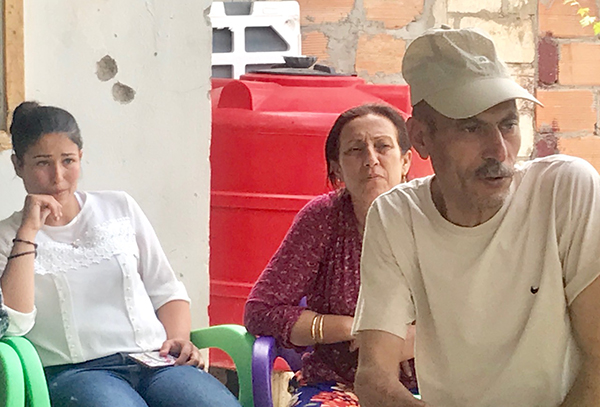
On this relief mission, we met some of the Yezidis who had fled Afrin when the FSA and Turks attacked. There were 68 families living in the rubble of an abandoned Christian village near Tel Tamir. The once magnificent church had been destroyed by ISIS and all the Christians were gone. Once ISIS was defeated here last year, the Christian building owners, many of whom are currently outside Syria, were asked if Yezidis could stay in their houses. They answered that the Yezidis were welcome in the village and so the Yezidis moved in, choosing the most intact houses, patching up holes in roofs and walls.
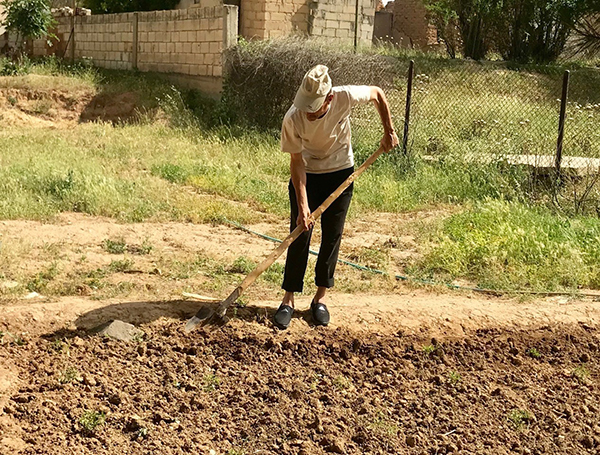
One of the Yezidi men told us, “There is no way we could stay back in Afrin. The FSA put the word out that they would do to us the same that was done by ISIS to Yezidi people in Sinjar. They would kill the men and enslave the women. We had to flee. Why didn’t anyone help us? Weren’t the deaths of thousands of Yezidis in Sinjar and other parts of Iraq enough? Where was America? Where was the world? We have lost everything and we cannot go back. Thousands of Muslims from outside the area have flooded in and taken our homes and land. What will become of us?”
Our hearts were broken and we nodded in sympathy.
Then one of the Yezidi men said, “This may make you angry, but you should know we all blame America for this, too.”
I prayed as to how to answer him and said, “America did not do this. We are not to blame for the attacks and your loss.”
The man opened his mouth to answer but I continued, “But we are to blame in that we did not stop it and we could have. We let it happen and did nothing to stop the FSA and Turks. We did not give needed help to the people who fled. I am so sorry. Please forgive us and pray for us. America is not God nor is it the devil. We are people. People cannot solve every problem but we can respond to those in front of us as we are able. America is in Syria, was able to help and did not. I am sorry. Please pray that the American Government will change its mind and help you. There are many in America who care and we were sent here by them.”
At this point, I could feel the pain that these people felt and the seeming hopelessness of the situation. I could see the hurt in their eyes.
I asked, “Can I pray?” They said yes and so I prayed and asked God for help. I asked for needs to be met and justice to be done. I asked for a return home or a better life in a new place. I asked for us all to depend not on nations but on God and I prayed for healing for all of us in Jesus name. I prayed that America and those countries that could help, would. I prayed that we could help more and I prayed most of all that Jesus would help these people. I thank God for my country, America, and all the good it has done and I pray we can do more.
After the prayer, the Yezidis and our team organized a day of soccer with the kids, a Good Life Club program, and a medical clinic run by our medics from Burma. We conducted all these programs in what once was a grand church fellowship hall next to the destroyed sanctuary. There were gaping holes and broken tiles in the roof from mortar shells, broken glass was everywhere, and the walls were pockmarked with bullet holes. ISIS had even machine-gunned a beautiful mural of streams, farms, mountains, and snow, that hung on one end of the hall.
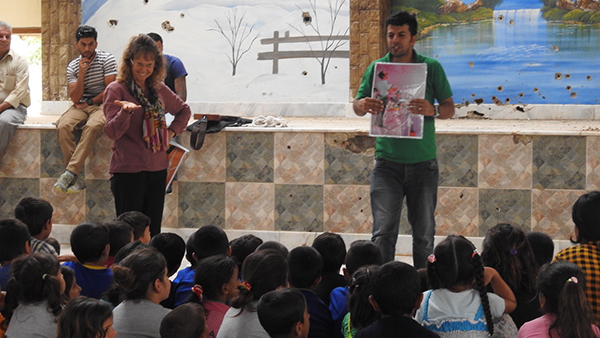
In spite of the destruction to the hall, their joy grew as the program went on. Laughter rang out and the children shouted in delight. At the end of the day we handed out snacks and shirts from our friends at Reload Love as well as toy lions and lambs from Victor Marx and All Things Possible Ministries. There were smiles all around and it felt like a ray of light – a ray of love – had penetrated the gloom. We felt God was with us and the Yezidis. That night we slept out under the stars and thanked God.
In the midst of pain, loss, and injustice, God’s presence and the prayers and love of others gives us hope and purpose. Jesus words remind us that, “On this rock I will build my church and the gates of hell shall not prevail against it” (Matthew 16:18, ESV).
A Kurdish Medical Doctor Shares Her Perspective
After our mission, we heard from a Kurdish medical doctor who shared this with us:
“The beauty in the middle of this disaster was the great medical team as it was a mirror image of the kind of society they come from. Doctors and medical staff who were Zaradeshti, Yezidi, Christian, and Muslim, some married couples from different religions. When I asked them about the kind of religion that their children would choose, they put it in such an amazing way – only love of God.
In the past, all were registered as Muslim by the Syrian regime. Only in the past couple of years have they been free to speak aloud about their religion and beliefs, thanks to the freedom that was brought by Kurdish freedom fighters.
NATO and the EU allowed Erdogan, the Turkish leader, to [commit] destruction and killings, but one thing that he couldn’t do was kill the kind of spirit that was in that simple clinic and volunteer people from Afrin. If you think what we saw in Sinjar, Iraq, among the Yezidi was unthinkable, then you should know that what is going on in Afrin is even worse.
People from Afrin and those who were displaced earlier due to ISIS (about 400,000 people) were attacked and escaped to ruins from previous battles. They found shelter in ruins, in their cars, in the fields, and everywhere. They are spread out in 15 different villages in the Shabah region. Nearby there are still a few villages under the control of ISIS, otherwise the area is controlled by the Syrian government so there is no excuse for the United Nations not to come and help. People are asking why nobody stopped the Turkish airstrikes. Why did they allow Erdogan to destroy peoples’ homes? Why and why and why….
Hopelessness and helplessness can’t get worse and deeper. I will never forget the tears of the Yezidi women who told me about her olive trees. She was a successful civil engineer and when her three children grew up and became independent, she started her own olive oil farm. She told me about how her trees were like her children. She told me of the pain she was feeling. Her trees felt like her children and so when she fled it felt like she was abandoning her children to be burned to ashes. The world did not do anything to save her trees. And it did nothing to save her or her children.”
“No Pictures” and the Power of Prayer
I want to close with this story of the power of Jesus through prayer to change hearts.
When we first met with the IDPs, we walked over to see the destroyed church. I was taking photos when a man in uniform came up to me and said, “No photos, no photos!”
I was surprised and irritated as it was normal to take photos of areas damaged by ISIS. I started to fire back an answer but instead I prayed, “Lord Jesus, please help me with this man. I will do it your way.”
I felt a peace come over me and turned to him and reached out and shook his hand. “Thank you for helping protect the people here and I am sorry for all you have lost,” I told him. “I was taking photos to show what bad things have happened here under ISIS. I hope that is ok.”
He replied, “Yes, we lost a lot. I was captured by ISIS and held for two years.” He pointed to his legs and said, “I was tortured and beaten badly on my legs and I am still suffering.”
“Can I pray for you?” I asked.
He said yes and in the ruins of the church we prayed together for God’s healing and restoration. Then he looked up at me and said, “It is not a problem, please take all the pictures you need.”
Later on, at the GLC program, he brought his wife and daughters up to me to introduce them. We had become friends. When I prayed for help, Jesus changed my heart and the soldier’s heart.
Thank you for caring and for all the help you give.
God bless you,
Dave, family, and teams
